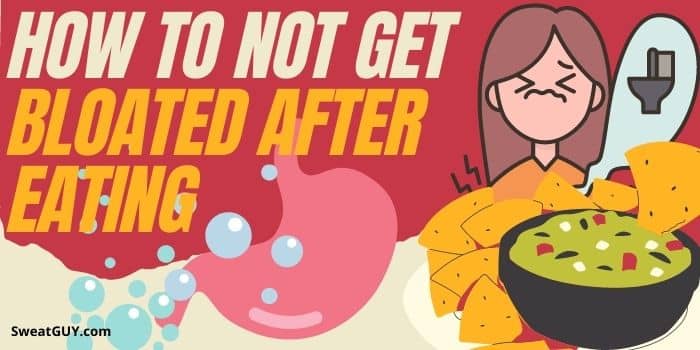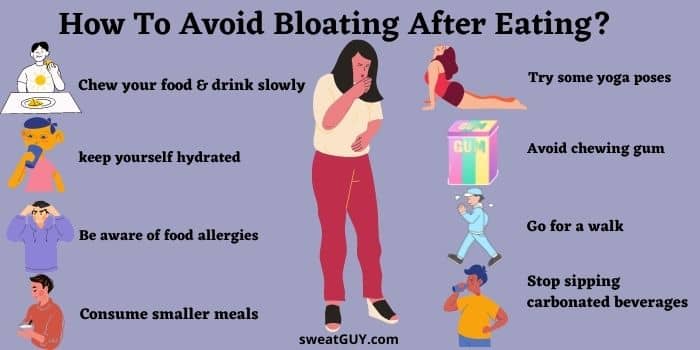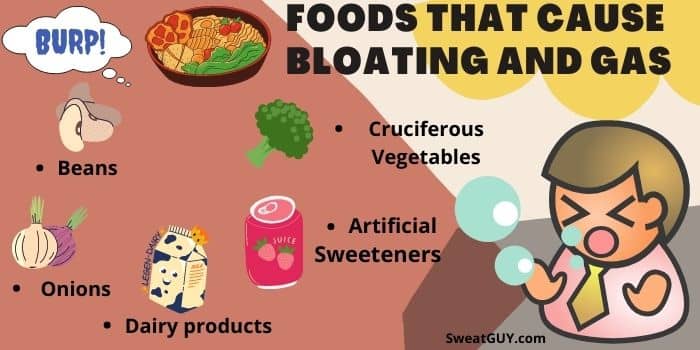Poor Diet and bloating are best buddies!
Holiday seasons bring out your extra-indulgent side and leave you not only with extra holiday weight but also with an irritated stomach.
TBH there’s nothing more discomforting than stomach bloating.
It literally makes you feel like crawling back into bed.
Moreover, while bloating after eating is usual and is generally not something to be worried about, it definitely is gross.
However, the good news is you just don’t have to sit around uncomfortably and deal with the embarrassment.
If you know how to get rid of bloating after eating, you can freely dig into thanksgiving turkey and Christmas cake.
So, let’s find out how to prevent bloating after eating to relieve gas and other painful symptoms.
How To Avoid Bloating After Eating?

There’s no denying that bloating is downright unpleasant and uncomfortable, and you’d want to know how to not get bloated after eating.
Try these tips to avoid bloating after eating and get your digestion back on track:
#1. Be Aware Of Food Allergies
#2. Chew Your Food And Drink Slowly
#3. Stop Talking While Eating
#4. Keep Yourself Hydrated
#5. Go For A Walk
#6. Try Some Gentle Yoga Poses
#7. Avoid Chewing Gum
#8. Consume Smaller And Frequent Meals
#9. Stop Sipping Carbonated Beverages
#10. Skip The Alcohol
With all that said, mild bloating is a common part of natural digestion.
However, if it makes you uncomfortable, you must make some lifestyle changes to avoid its frequent occurrences.
Follow these 10 quick tips to get rid of upper abdominal bloating after eating and get back to your holiday mode.

#1. Be Aware Of Food Allergies And Intolerance
Food allergies and intolerance can cause excessive gas production that when gets trapped in the gastrointestinal tract leads to bloating.
Moreover, bloating is also a basic sign of food allergy and intolerance.
Therefore, if you have food allergies, try avoiding the consumption of such foods.
Moreover, you can also maintain a food journal list of the foods you are allergic to if you suspect food allergies to be the culprits behind those troublesome bloating.
#2. Chew You Food Properly And Drink Slowly
You swallow more air when you try to eat and drink quickly, which will lead to the building up of more gas in the gastrointestinal tract.
Hence, it is advised to chew your food and drink slowly and properly.
Moreover, if you know fat eating is the reason behind your bloating, then instead of chugging drinks after drinks, and making your mealtime a speed race, take your time and simply slow down.
#3. Stop Talking While Eating
Bloating happens because of the production of excessive gas in the gastrointestinal tract and the bad habit of talking while eating will only add to the problem.
That is to say, talking while eating will only increase the chances of swallowing air.
Which will lead to gas build-up and bloating.
Hence, avoid talking much if you don’t want to feel bloated after relishing the delicacies.
#4. Keep Yourself Hydrated
You might not even feel like moving an inch let alone drinking a glass full of water when you already feel like your belly is about to burst.
But hydration is of utmost importance if you want to reduce bloating.
Notably, because sodium retains water, salty foods are one of the reasons behind bloating.
And drinking water will offset the effect of sodium and will provide relief from bloating.
#5. Go For A Walk
If you want to know what relieves bloating fast, going for a short walk is probably the answer you are looking for.
Instead of slouching on the couch, you can try going for a short walk.
This will help stimulate gastric mobility and minimize bloating.
#6. Try Some Gentle Yoga Poses
Give your body a nice stretch through some gentle yoga poses such as cat/cow pose and child’s pose.
This will allow your body to activate the parasympathetic nervous system or the digest mode.
This will lead to better digestion and absorption of food and leaving behind nothing but a calm stomach.
#7. Avoid Chewing Gum
You already know that swallowing extra air leads to bloating and gas.
And if you are a person who is into chewing gums, you must avoid having it especially during the holiday seasons to avoid building up extra air in the gastrointestinal tract.
In case you want to freshen your breath, you can switch gums with candies.
#8. Consume Smaller And Frequent Meals
Instead of loading yourself with traditional three big meals, you can opt for small 6 meals at regular intervals.
An empty stomach often leads to the production of excessive gas in the body.
This is why even health professionals advise you to eat frequent smaller meals from time to time to avoid bulking up of your stomach
#9. Stop Sipping Carbonated Beverages
Sipping on carbonated fizzy beverages like soda might make you feel better by inducing burps but all it does is add gas to your system.
Bubbles in the carbonated drinks build up in the gastrointestinal tract and cause bloating.
And one of the basic solutions of how not to bloat after eating is switching fizzy drinks with still water.
#10. Skip The Alcohol
You might feel tempted to pour yourself some more of your favorite drink after dinner.
But your swollen and growling stomach might not like your idea.
Basically, alcohol makes your body dehydrated and slows the process of digestion.
So in order to keep your belly away from bloating, keep yourself away from alcoholic drinks after eating.
While feeling bloated after eating is a normal concern, these effective and doable tricks and tips will help people know how to avoid bloating after eating.
Moving further, we exactly know how much of a nuisance a bloated stomach can create in a day.
Adding to this, the fact that bloating is related to digestion, stomach, and gastrointestinal tract, there is no surprise that diet plays a major role in leaving your stomach bloated.
Hence, it becomes important to focus on the foods that cause bloating.
Having said that, here are some of the…
Foods To Avoid To Prevent Bloating

On a basic level, an unhealthy lifestyle has a lot to do with the issue of bloating.
Munching on your favorite fast foods steals all the nutrition from your diet and fills you with excess sodium and saturated fat which leaves you dehydrated and affects your gut health as well leading to a bloated stomach.
And if you often have to deal with it and don’t know how to not bloat after eating, it’s time to make some changes in your food.
Here’s is the list of some foods that cause bloating:
#1. Beans
When it comes to food, beans are the real culprits behind gas and bloating.
While they are selectively healthy and can relieve constipation, they also cause a lot of gas and bloating.
Beans contain two such fibers (resistant starch and GOS) that are hard for our body to digest as a result, gut bacteria feed on them and their fermentation leads to the formation of gas.
#2. Onions
If you are prone to acid Reflux, onions can cause a lot of Bloating.
To avoid it, you can switch to green onions and chives.
#3. Dairy Products
Nearly 65% of the worldwide population lacks the ability to completely digest lactose.
If you are lactose sensitive or lactose intolerant, the lack of enzyme lactase leaves an undigested food in your stomach leading to fermentation and hence bloating.
Moreover, people who aren’t aware of their lactose intolerance and don’t know how to avoid bloating after eating often try to treat it with ice cream.
It might worsen the scenario.
In this case, try eating 0% fat Greek yogurt.
You can also try lactose-free alternatives like oat milk, almond milk, and coconut milk.
#4. Artificial Sweeteners
Certain sugar-free snacks contain sugar alcohols that cause bloating.
Adding to this, consuming a lot of snacks with artificial sweeteners can also be one of the reasons behind your bloated stomach.
Moreover, if you are fructose intolerant, you are likely to witness bloating and GI symptoms.
#5. Cruciferous Vegetables
Vegetables that belong to the cabbage family are most like to cause bloating more than others.
Cruciferous vegetables are naturally hard for the body to digest.
For instance, Brussels sprouts contain GOS that is also found in beans.
The cruciferous veggies that you need to avoid to prevent bloating after eating are:
- Cauliflower
- Brussels Sprouts
- Broccoli
You can replace these vegetables with others from the same vegetable family such as bok choy, Arugula, Cabbage (in moderation).
So, you must avoid eating these foods to reduce bloating quickly in case you are not dealing with any digestive issues.
In A Nutshell
Whether it’s an after effect of indulgence or one of those period symptoms, or it’s because of constipation.
The above-mentioned points will undoubtedly help you know how to avoid bloating after eating.
In most situations, occasional gas and bloating don’t require any medical attention.
Usually, with self-assessment of eating habits, food intolerance, and lifestyle changes, you can easily tackle the stomach discomfort.
However, if the frequency of your bloating is chronic, you must not delay fixing an appointment with your health provider to avoid something more serious.
If you enjoyed the blog, feel free to share it with your friends and family!
Also, you can leave your thoughts and queries down below in the comments section.